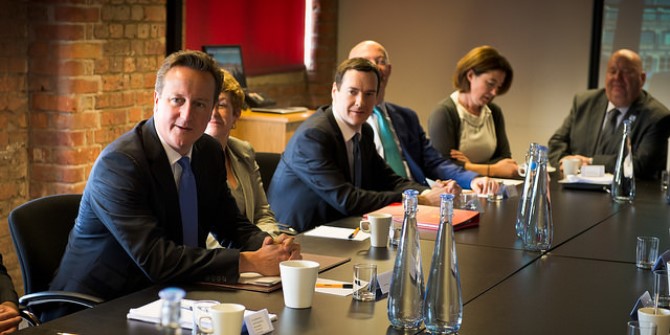 Civil service leaders are appearing publicly more often, in more places, and to a wider range of audiences, than ever before. Does it matter if civil service leaders become more public figures than they have previously? Dennis Grube argues that the reason these changes matter is because the traditional anonymity of civil servants is linked in important ways to the impartiality of the civil service; dispensing with the former is to endanger the latter.
Civil service leaders are appearing publicly more often, in more places, and to a wider range of audiences, than ever before. Does it matter if civil service leaders become more public figures than they have previously? Dennis Grube argues that the reason these changes matter is because the traditional anonymity of civil servants is linked in important ways to the impartiality of the civil service; dispensing with the former is to endanger the latter.
Sir James Stephen was a distinguished under-secretary of state at the British Colonial Office from 1836 to 1847. In 1854 he was asked for his views on the idea expressed in the Northcote-Trevelyan report that civil servants should be selected on merit through competitive examination rather than through the system of patronage that then prevailed. He was against the plan, not because of its lack of logical appeal, but because he could see no prospect of people actually being drawn towards a career in the Civil Service:
“The money to be earned is the solitary attraction. A clerk in a Public Office may not even dream of fame to be acquired in that capacity. He labours in an obscurity as profound as it is unavoidable…entombed for life as a clerk in a Public Office in Downing Street. Why invite an athlete into a theatre, where no combat, and no applause, and no reward, awaits him?”
The obscurity or anonymity of which Sir James wrote has played a central role in the life of Westminster system civil servants ever since. And this anonymity included even those at the very top of the civil service hierarchy. Throughout the twentieth century, the all-powerful mandarins who wielded immense influence at the centre of government were largely unknown to the wider public. To quote Peter Hennessy from the 2011 BBC documentary The Secret World of Whitehall, ‘they were scarcely household names in their own household’. With, as Stephens would put it, ‘no combat, and no applause, and no reward’ – other than a quietly bestowed knighthood perhaps – such mandarins diligently went about their work behind the scenes.
Things have changed. The environment in which senior civil servants work today is fundamentally different. A 24/7 news media with a voracious appetite and attack-dog instincts provides a ceaseless stream of electronic and print-based communication, incorporating video and audio that can immediately bring mistakes to life. The advent of forums such as Senate committee hearings in Australia and select committees in the UK have seen civil servants brought before MPs to publicly answer for aspects of public administration. The arrival of social media has seen bureaucracies embrace the opportunities of Twitter and Facebook, adopting direct forms of public communication that were previously simply unavailable. And as Rod Rhodes observed in his 2011 book Everyday Life in British Government, “…nowadays, senior civil servants speak in public almost as often as ministers”. In short, civil service leaders are appearing publicly more often, in more places, and to a wider range of audiences, than ever before.
The question for scholars and practitioners is: should we care? Does it in fact matter if civil service leaders become more public figures than they have previously? I argue that the reason these changes matter is because the traditional anonymity of civil servants is linked in important ways to the impartiality of the civil service. To dispense with the former is to endanger the latter in ways that re-shape the core role of civil service leaders in a Westminster system.
The late Canadian academic, Peter Aucoin, argued that what we are seeing is the emergence of what he termed ‘promiscuous partisanship’, the idea that civil servants are now expected to support government policy with the same fervour as if they were in fact partisans. The only difference being that they must then turn around and offer exactly the same fervour in turn to the next government when a change of government occurs. To quote Aucoin directly:
“The anonymity of public servants, as invisible to parliament or the public, disappeared some time ago…[M]inisters, sometimes explicitly, usually implicitly, expect those public servants who are seen and heard in countless public forums to support government policy, that is, to go beyond mere description and explanation…[W]hen the public value of what the government is doing is disputed, they expect public servants to rise to the challenge. To the degree that ministers can expect public servants to do so without instruction, the culture is infested with the norm of promiscuous partisanship.”
Aucoin’s insight is significant, and his concerns about any decline in impartiality very real. But I argue that what has changed is not that civil service leaders have suddenly become partisan but rather that they have recently become ‘public’, allowing for perceptions of partisanship to emerge. Senior mandarins work at the interface of politics and administration. Their job is self-evidently not removed from the politics which surrounds it. That is why only anonymity can protect them from perceptions that they are partisan or political in the statements they make.
Recent cases in countries that share the Westminster system of government demonstrate that once civil servants are publicly associated with a particular piece of policy advice and analysis, allegations of politicisation frequently follow. To give just three examples: In the UK in 2014 George Osborne publicly released the advice of the Treasury Permanent Secretary, Sir Nicholas Macpherson, on the potential consequences if Scotland voted to leave the union. A row ensued over whether this politicised the position of the Treasury Secretary. In Australia in 2014 Treasury Secretary Martin Parkinson was accused of politicising his position when he gave a public speech interpreted as criticising the Labor Opposition for their response to the government’s budget. In Canada, a 2014 report by the think tank ‘Canada 2020’ suggested that the Clerk of the Privy Council Wayne Wouters had taken on ‘…the highly political role of spokesperson for blocking parliamentary oversight of public finance’, in his dealings with the Parliamentary Budget Officer.
These are just three cases amongst many. Once the advice of civil servants becomes public, it opens their views to everyone who may wish to comment upon them. Frank and fearless advice that was once confined to a private office becomes instead a matter of public debate. Inevitably, this then leads to charges of politicisation and partisanship, as civil servants are attacked for being too close to government policy, or sometimes for being seen to contradict it. It seems an invidious position. It is in fact the job of senior civil servants to be close to government policy, to discuss it with ministers, and to seek to implement it. When they do so privately, no wider perceptions or debates around politicisation can ensue. But when those debates are taken into the public domain, senior civil servants can find themselves engaged in exactly the kind of public ‘combat’ that Sir James Stephen felt was beyond their scope.
If governments are moving towards expecting civil servants to play a more public role, then some reconsideration of what we expect of administrative leaders is required. Westminster tradition needs to catch up with the new realities of practice and evolve some conventions that allow civil servants to fulfill their public roles without being targeted with allegations of partisanship.
Note: This post is an extract from a longer article first published by the author in The Political Quarterly, and is available here. It gives the views of the author, and not the position of the British Politics and Policy blog, nor of the London School of Economics. Please read our comments policy before posting. Featured image credit: Olivier Bacquet CC BY 2.0
 Dennis Grube is Associate Professor and Principal Research Fellow in the Institute for the Study of Social Change at the University of Tasmania. He holds an Australian Research Council DECRA grant for the period 2013-2016, working on a comparative project assessing the role of public service leaders as public actors in Canada, Australia, New Zealand and the United Kingdom. He has published in the areas of public leadership, political rhetoric, and British political history, and is the author of At the Margins of Victorian Britain: Politics, Immorality and Britishness in the Nineteenth Century (I.B. Tauris, 2013) and Prime Ministers and Rhetorical Governance (Palgrave Macmillan, 2013).
Dennis Grube is Associate Professor and Principal Research Fellow in the Institute for the Study of Social Change at the University of Tasmania. He holds an Australian Research Council DECRA grant for the period 2013-2016, working on a comparative project assessing the role of public service leaders as public actors in Canada, Australia, New Zealand and the United Kingdom. He has published in the areas of public leadership, political rhetoric, and British political history, and is the author of At the Margins of Victorian Britain: Politics, Immorality and Britishness in the Nineteenth Century (I.B. Tauris, 2013) and Prime Ministers and Rhetorical Governance (Palgrave Macmillan, 2013).







“this anonymity included even those at the very top of the civil service hierarchy”
Senior Civil Service has is the customary level in modern times at which individual officials are individually named in press notices or public inquiries etc. There has been no real blanket expectation of anonymity at that level in recent times.
Separately I don’t think it is a logical progression to argue that increased public exposure compromises impartiality. It’s seems equally likely that increased profile/visibility will increase mandarins’ sensitivity about the need to be perceived as impartial.